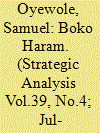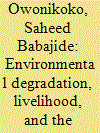|
|
|
Sort Order |
|
|
|
Items / Page
|
|
|
|
|
|
|
| Srl | Item |
| 1 |
ID:
139297


|
|
|
|
|
| Summary/Abstract |
The Boko Haram insurgency has emerged as one of the greatest threats to human security in Africa, and the Lake Chad region in particular. This is a region with a total area of 427,500 km2, which covers/ Cameroon, Chad, Niger and Nigeria. The movement known as Boko Haram (Western education is forbidden) originated in Nigeria in 2002. The official name of the movement is Jama’atu Ahlis Suna Lidda’awati Wal Jihad (People Committed to the Propagation of the Prophet’s Teachings and Jihad). The group was formed on the charismatic preaching of Yusuf Muhammad, which attracted hundreds of thousands of followers across northern Nigeria, Cameroon, Niger and Chad. The group’s campaign is informed by Islamic revivalism, widespread poverty, political corruption, repression and a weak justice system in the region.
|
|
|
|
|
|
|
|
|
|
|
|
|
|
|
|
| 2 |
ID:
178526


|
|
|
|
|
| Summary/Abstract |
Narrations on fragility and resilience in the Sahel paint a picture about the region’s inherent ungovernability that lead to consider an endless state- and peace-building process as the most feasible governance solution. Everyday practices of violent entrepreneurship, coalescing with inter-community and land-tenure conflicts, now inform social relations and are transforming moral economies around Lake Chad. While competition over territory suitable for farming, grazing and fishing has intensified, dispute-settlement practices organised by community-level authorities have proven ineffective and lacking the necessary means to respond to the encroachment of a wide range of interests claimed by increasingly powerful actors. Meanwhile, communities organised in self-defence militias are undergoing a process of progressive militarisation that tends to normalise violence and legitimise extra-judicial vigilante justice, further empowering capital-endowed arms suppliers gravitating in the jihadi galaxy, such as the Islamic State West Africa Province (ISWAP).
|
|
|
|
|
|
|
|
|
|
|
|
|
|
|
|
| 3 |
ID:
173391


|
|
|
|
|
| Summary/Abstract |
The socio-economic conditions of the inhabitants of Lake Chad Region (LCR) in the instability of the region has been well researched. But there has been relatively little work on how environmental conditions contribute to the expanding instability of the region. Using data collected from both primary and secondary sources, this study shows how the shrinking Lake Chad contributes to the instability of the LCR. The study finds out that in the last six decades, climate change, over-exploitation and demographic pressure have contributed to the shrinking of the waterbody by over 90% leading to inability to sustain livelihoods of inhabitants. Loss of livelihoods has promoted criminality, easy recruitment by terrorist groups, migration to urban centres in search of better means of livelihood. This has also led to violent clashes and crimes in cities and towns. Furthermore, management of the shrinking lake has caused conflicts among the riparian states and this has greatly inhibited their ability to collective fight insecurity in the region. The study concludes that in enhancing the stability of the Lake Chad Region, addressing the shrinking Lake Chad must be given priority by the riparian states and other concerned stakeholders.
|
|
|
|
|
|
|
|
|
|
|
|
|
|
|
|
| 4 |
ID:
147719


|
|
|
|
|
| Summary/Abstract |
Boko Haram is an Islamic sect turned terrorist group. Despite its ethnic leaning, it is not a liberation front, and it does not advocate a people’s revolution. From an ideological point of view, it is a jihadist movement because it fights for full implementation of strict sharia law which would require a change of political regime and the establishment of an Islamic state. But it does not really follow the Wahhabi model of Al Qaeda or Daesh, unlike AQIM in Northern Mali or Al Shabaab in Somalia. In the region of Greater Borno, which encompasses parts of Nigeria, Chad, Niger, and Cameroon, the sect remains embedded in local dynamics which this article explores through an analysis of the mobilization of its members.
|
|
|
|
|
|
|
|
|
|
|
|
|
|
|
|
|
|
|
|
|